How two Jewish musicians turned front porches in Brooklyn into a vibrant music scene
Roy Nathanson and Aaron Lisman are turning Ditmas Park residents of all ages into jazz aficionados
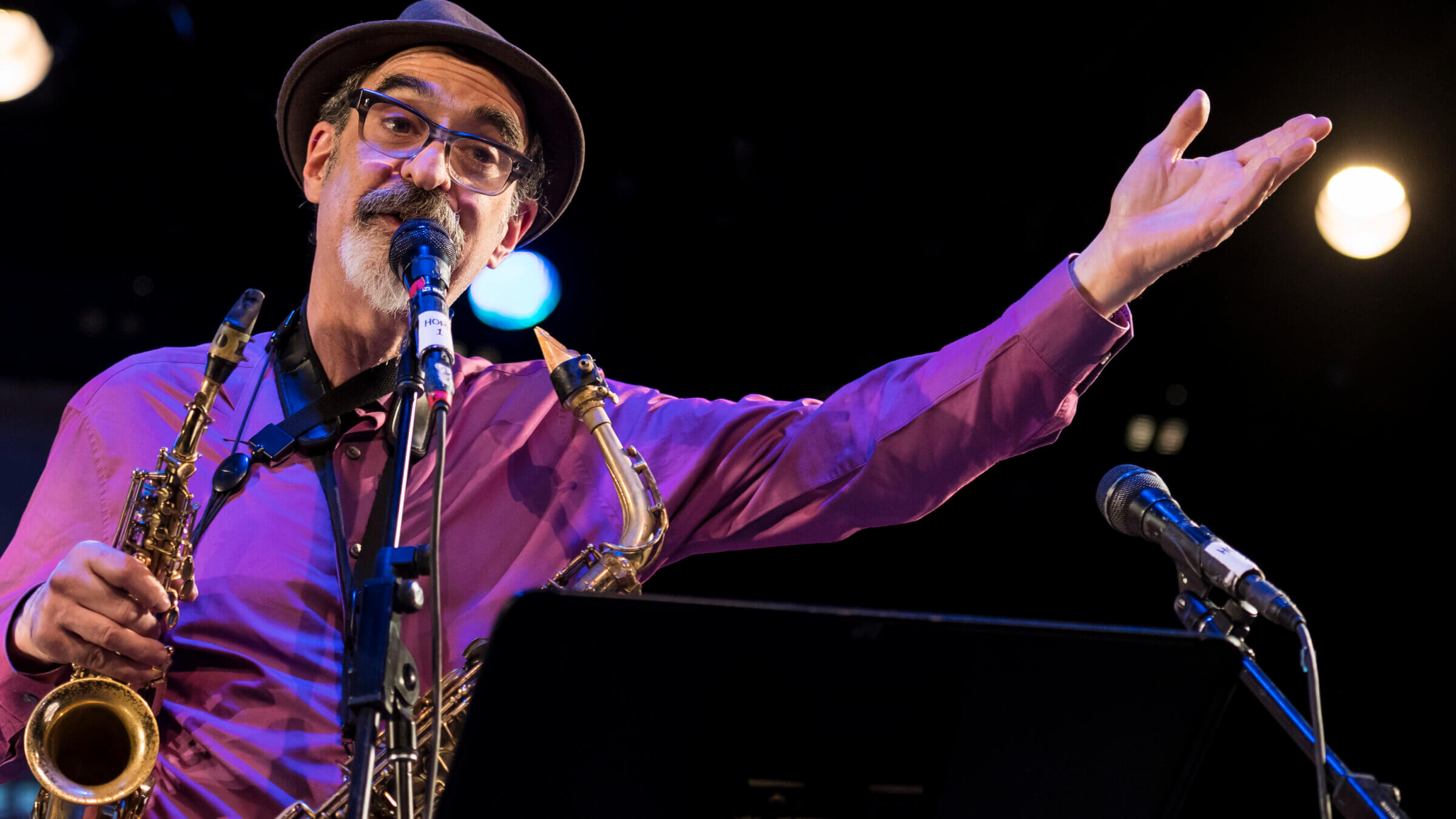
Roy Nathanson performs at Symphony Space, 2017. Photo by Getty Images
In the Ditmas Park section of Brooklyn, working class apartment dwellers can be found making music on the porches of million-dollar Victorian homes that line the neighborhood’s leafy streets, thanks to a pair of nonprofits run by two Jewish musicians. Both of the porch music groups sprang to life during the dark days of the pandemic and have tapped into a local resource: Ditmas Park is “thick with jazz musicians.”
“I totally believe in tikkun olam,” jazz saxophonist Roy Nathanson told me, referring to the Jewish concept of repairing the world. “I’m very connected to the idea of prayer and religion healing and in this world, it’s got to be connected to social justice.”
Nathanson grew up in Ditmas Park and came back as an adult after living in Manhattan.
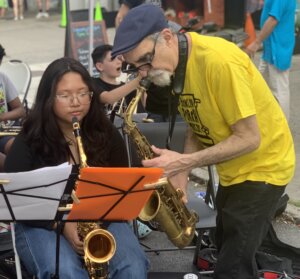
“I feel very strongly about gentrification and the idea of keeping it a mixed neighborhood ethnically and class-wise,” he said during an interview on the porch of his home on Marlborough Street shortly before a concert in which 30 kids performed on a closed off section of the neighborhood’s main commercial thoroughfare, Newkirk Avenue.
The Brooklyn Porch Music non-profit Nathanson founded grew out of his ritual of playing a song every day at 5: 00 p.m. for nearly three months from his porch. His wailing soprano sax performance of “Amazing Grace” seemed to be contagious. Other musicians showed up on his lawn and the street in front of his house to play with him, keeping social distance and wearing masks if they weren’t blowing into a horn.
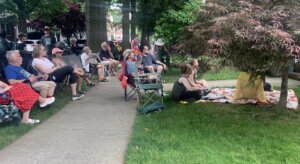
The jam sessions moved to a nearby home with a driveway and served as a reminder that the city still comprised what the late mayor David Dinkins called “the gorgeous mosaic.” Jamming with Nathanson were Eddie Beaujolais, the Haitian guitar player; Salim Mohammed, a Pakistani percussionist; the bassist Bam Rodriguez; Albert Marques, a pianist who played with the great Latin jazz band leader Arturo O’Farrill; and the African-American jazz guitarist Keyanna Hutchinson.
With schools closed as part of the pandemic lockdown, the professional musicians decided to start offering free instruction on instruments they provided to neighborhood kids. Most of the original teachers have moved on to other endeavors but the teaching duties have been taken over by Milena Casado, a trumpeter who grew up in Spain, and Aidan Scrimgeour, a pianist and accordion player who lived in a collective house down the block from Nathanson. in addition to teaching saxophone, Nathanson, who has an MFA in poetry, has the kids writing poems and songs. Ten-week sessions in both the summer and fall draw 30-to-40 children.
“The kids write songs about the neighborhood. I want them to be proud of this neighborhood,” said Nathanson. “I want to enrich their lives and for the families to know each other.”
Nathanson’s track record of working with students dates back decades and includes a stint at the Institute for Collaborative Education (ICE), a non-traditional high school and middle school in Manhattan where he says he was told he could “do whatever I want.” Between 2008 and 2016 he made five trips to Europe with the school’s students, who wrote poems and performed them at concerts with Nathanson’s band, the Jazz Passengers.
“Roy Nathanson has a big heart that reaches across the world and across his neighborhood,’ said Paul Shapiro, a Manhattan sax man who has known Nathanson for decades. “Roy brought this vision to the kids he taught at ICE and now to his neighborhood where he is working with those striving to maintain its diversity and inclusion.”
Operation Gig
Another Ditmas Park resident, Aaron Lisman, a software developer at Memorial Sloan-Kettering Hospital, has many friends in the neighborhood who are jazz musicians. Early in the pandemic, he became aware they were playing on porches.
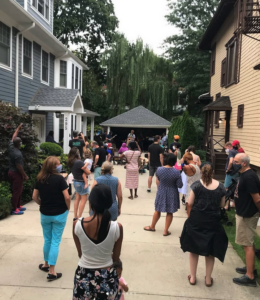
“They were playing for free and it struck me as a shame” Lisman told me on a recent Sunday as he delivered power strips and cold beer to a trio setting up on the porch of a house across the street from his home.
“I saw that as a community we needed to support these musicians who had completely lost their livelihood,” he said. “We could pretty easily put our money together and create decent-paying gigs.”
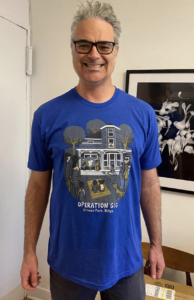
So Lisman founded Operation Gig in the Summer of 2020, which has set up more than 200 weekend porch concerts since then. More than 100 acts have serenaded audiences lounging on blankets spread across lawns or sitting in camp chairs. The area in front of the steps leading up to the porches is often occupied by young children bouncing along to the beat.
Operation Gig’s concerts rely on 30 different homeowners, including an 87-year-old woman who has hosted 75 concerts at her multimillion dollar home on East 16th Street,.
The musical acts, which have included bluegrass, honkytonk, jazz, salsa, blues and Middle Eastern artists, perform two one-hour sets. Halfway through each setm Lisman give a little rap about the need to support working musicians, suggesting a donation of $10 per person. In 2023 an end of season fund drive raised $12,000 from grants and individual contributors. Initially Operation Gig aimed to pay each musician $75 but that sum has now reached $150, “which is right up there with any small club in the city that features world-class musicians,” Lisman said.
“Sadly, we pay better than a lot of the club gigs in this city. That’s the shocking thing.”
Operation Gig’s core audience consists of parents with small kids and older folks who aren’t going to clubs to see live music in Manhattan, said Lisman.
Last Sunday Jefferson Hamer, a singer/songwriter who lives in Crown Heights, played his mostly original electric folk repertoire.
“It’s a great way to see the neighborhood and this house is so much nicer than mine,” Hamer joked. “It’s a great thing Aaron does for us musicians, giving us a gig, to get outside in the summertime and play together and get paid and have fun. I love it.”
















